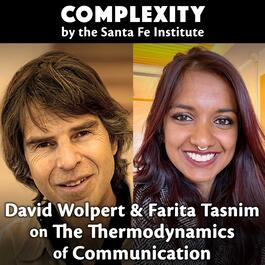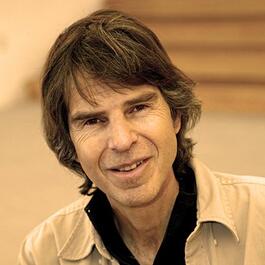
David Wolpert & Farita Tasnim on The Thermodynamics of Communication
Communication is a physical process. It’s common sense that sending and receiving intelligible messages takes work…but how much work? The question of the relationship between energy, information, and matter is one of the deepest known to science. There appear to be limits to the rate at which communication between two systems can happen…but the search for a fundamental relationship between speed, error, and energy (among other things) promises insights far deeper than merely whether we can keep making faster internet devices. Strap in (and consider slowing down) for a broad and deep discussion on the bounds within which our entire universe must play… Welcome to COMPLEXITY, the official podcast of the Santa Fe Institute. I’m your host, Michael Garfield, and every other week we’ll bring you with us for far-ranging conversations with our worldwide network of rigorous researchers developing new frameworks to explain the deepest mysteries of the universe. This week we speak with SFI Professor David Wolpert and MIT Physics PhD student Farita Tasnim, who have worked together over the last year on pioneering research into the nonlinear dynamics of communication channels. In this episode, we explore the history and ongoing evolution of information theory and coding theory, what the field of stochastic thermodynamics has to do with limits to human knowledge, and the role of noise in collective intelligence. Be sure to check out our extensive show notes with links to all our references at complexity.simplecast.com. If you value our research and communication efforts, please subscribe, rate and review us at Apple Podcasts or Spotify, and consider making a donation — or finding other ways to engage with us, including a handful of open postdoctoral fellowships — at santafe.edu/engage. Lastly, this weekend — October 22nd & 23rd — is the return of our InterPlanetary Festival! Join our YouTube livestream for two full days of panel discussions, keynotes, and bleeding edge multimedia performances focusing space exploration through the lens of complex systems science. The fun begins at 11 A.M. Mountain Time on Saturday and ends 6 P.M. Mountain Time on Sunday. Everything will be recorded and archived at the stream link in case you can’t tune in for the live event. Learn more at interplanetaryfest.org… Thank you for listening! Join our Facebook discussion group to meet like minds and talk about each episode. Podcast theme music by Mitch Mignano. Follow us on social media: Twitter • YouTube • Facebook • Instagram • LinkedIn Referenced in this episode: Nonlinear thermodynamics of communication channels by Farita Tasnim and David Wolpert (forthcoming at arXiv.org) Heterogeneity and Efficiency in the Brain by Vijay Balasubramanian Noisy Deductive Reasoning: How Humans Construct Math, and How Math Constructs Universes by David Wolpert & David Kinney Stochastic Mathematical Systems by David Wolpert & David Kinney Twenty-five years of nanoscale thermodynamics by Chase P. Broedersz & Pierre Ronceray Ten Questions about The Hard Limits of Human Intelligence by David Wolpert What can we know about that which we cannot even imagine? by David Wolpert Communication consumes 35 times more energy than computation in the human cortex, but both costs are needed to predict synapse number by William Levy & Victoria Calvert An exchange of letters on the role of noise in collective intelligence by Daniel Kahneman, David Krakauer, Olivier Sibony, Cass Sunstein, David Wolpert When Slower Is Faster by Carlos Gershenson & Dirk Helbing Additional Resources: The stochastic thermodynamics of computation by David Wolpert Elements of Information Theory, Second Edition (textbook) by Thomas Cover & Joy Thomas Computational Complexity: A Modern Approach (textbook) by Sanjeev Arora & Boaz Barak An Introduction to Kolmogorov Complexity and Its Applications (textbook) by Ming Li & Paul Vitányi
From "COMPLEXITY"





Comments
Add comment Feedback